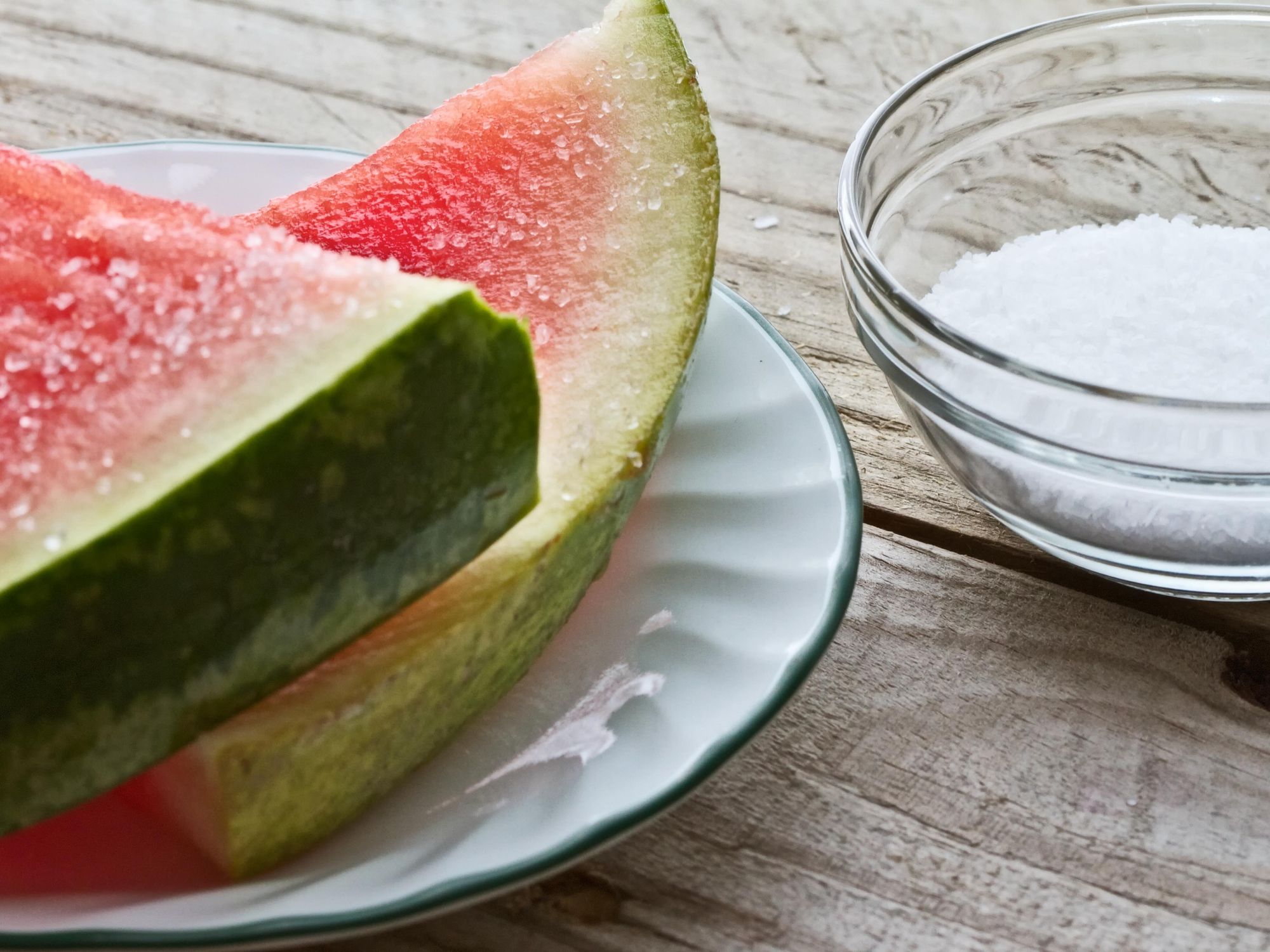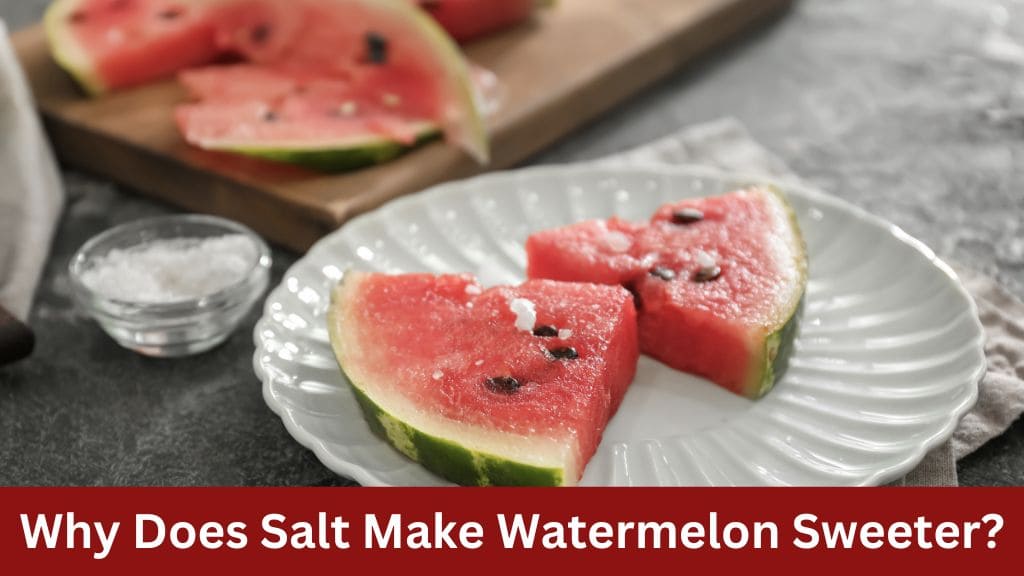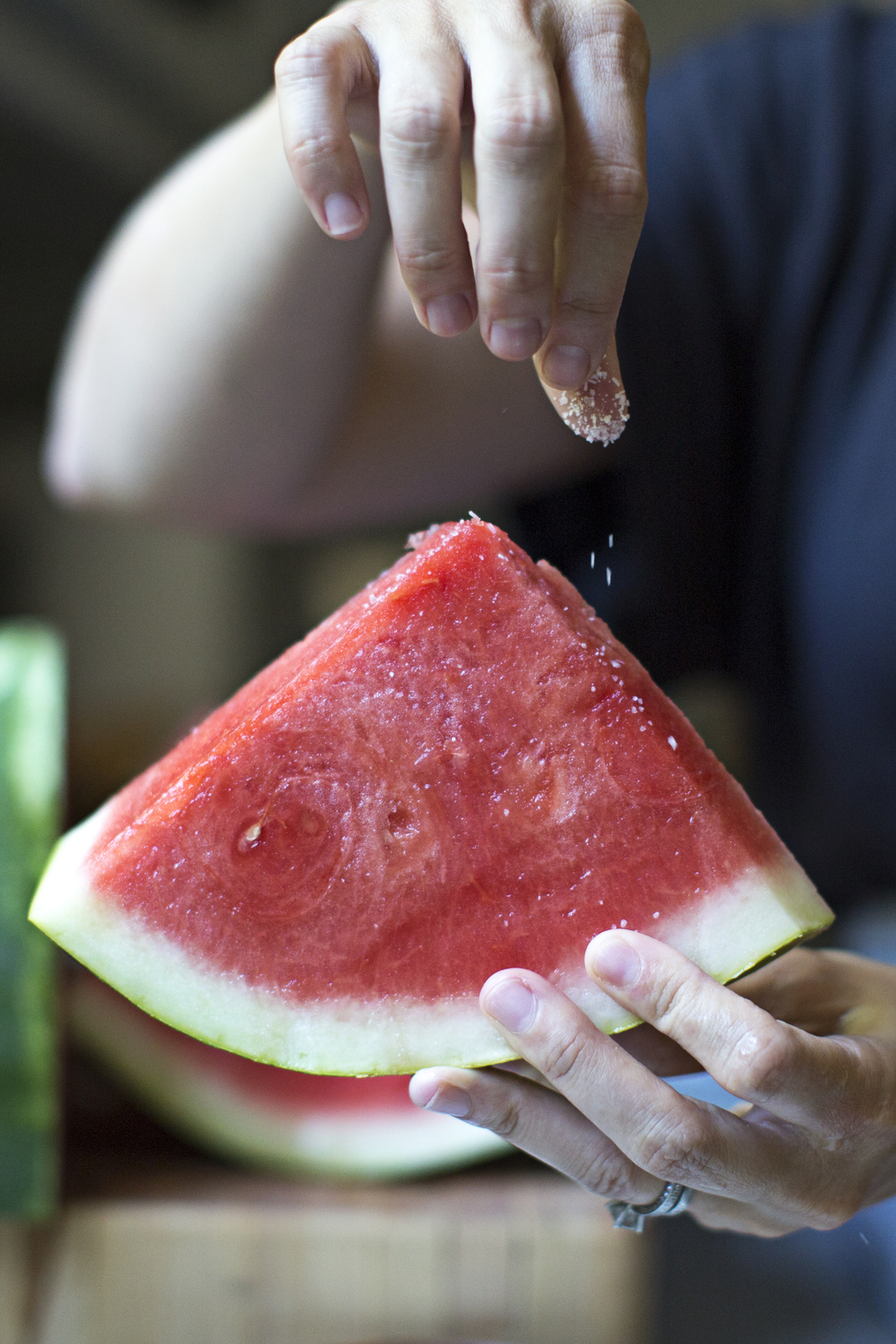Watermelon, with its juicy and refreshing flesh, is a quintessential summer treat. Yet, many people find that a sprinkle of salt can transform this already delightful fruit into an even more sensational experience. But why does salt make watermelon sweeter? In this blog post, we’ll explore the science behind this phenomenon, the cultural roots of this practice, and how you can enhance your watermelon-eating experience with various types of salt and complementary flavors.
The Science Behind Salt and Sweetness
:max_bytes(150000):strip_icc()/Salted_Watermelon_1x1-93a7cb9d1bd14784b0807c0827cbdd37-c5e2af6b3d8d495fb9060c6e01577207.jpeg)
The Chemistry of Taste
To understand why salt makes watermelon taste sweeter, it’s essential to delve into the chemistry of taste. Our taste buds are sensitive to five basic tastes: sweet, salty, bitter, sour, and umami. Each of these tastes is detected by specific receptors on our taste buds. When you eat something sweet, sugar molecules bind to the sweet receptors, sending signals to your brain that interpret the flavor.
How Salt Affects Flavor Perception
Salt, or sodium chloride, interacts with taste receptors in a unique way. When added to food, salt can suppress the perception of bitterness and enhance the perception of sweetness. This phenomenon occurs because salt ions interfere with the taste receptors that detect bitterness, effectively masking those flavors and allowing the sweetness to shine through more prominently.
Watermelon’s Flavor Profile
Watermelon has a complex flavor profile that includes sweetness from natural sugars, slight bitterness from certain compounds, and a refreshing watery taste. When you sprinkle salt on watermelon, it suppresses the minor bitter notes and amplifies the sweetness. This enhanced sweetness, combined with the juicy texture of the fruit, creates a more intense and enjoyable flavor experience.
Historical and Cultural Context
Ancient Practices
The practice of salting fruit is not a modern invention. Ancient civilizations, such as the Greeks and Romans, used salt to enhance the flavors of their food, including fruits. In many cultures, the combination of sweet and salty flavors is a time-honored tradition that continues to this day.
Regional Variations
In the United States, the practice of salting watermelon is particularly popular in the South. Southerners often claim this method as their culinary secret, but similar practices can be found worldwide. In Asia, for instance, fruits like mangoes and pineapples are often paired with salty and spicy condiments to enhance their sweetness.
How Salt Enhances Watermelon

Suppressing Bitterness
As mentioned earlier, salt’s ability to suppress bitterness is a key factor in making watermelon taste sweeter. Watermelon can sometimes have a slight bitterness, especially if it is not fully ripe. By reducing these bitter notes, salt allows the natural sugars in the watermelon to become more prominent.
Drawing Out Juices
Another way salt enhances watermelon is by drawing out its juices. Salt has hygroscopic properties, meaning it can attract and retain water. When you sprinkle salt on watermelon, it draws the moisture to the surface, making each bite juicier and more flavorful. This increased juiciness helps distribute the sweetness more evenly across your palate.
Balancing Flavors
Salt also acts as a flavor enhancer by balancing the overall taste profile of the watermelon. The interplay between sweet and salty creates a more complex and satisfying flavor that excites the taste buds. This balance is why many sweet dishes, such as salted caramel or chocolate with sea salt, are so popular.
How to Salt Your Watermelon

Choosing the Right Salt
When it comes to salting watermelon, not all salts are created equal. Here are a few options to consider:
- Coarse Salt: Coarse salt, such as sea salt or kosher salt, provides a satisfying crunch and a burst of salty flavor. It’s a great choice for those who enjoy a pronounced salty-sweet contrast.
- Flake Salt: Flake salt, like Maldon salt, has delicate, pyramid-shaped crystals that dissolve slowly on the tongue, offering a more nuanced flavor enhancement.
- Flavored Salts: Experimenting with flavored salts can add an extra dimension to your watermelon. Options like citrus-infused salt, smoked salt, or even spicy salts like ghost pepper salt can create exciting new flavor combinations.
How Much to Use
Start with a small pinch of salt and sprinkle it evenly over a slice of watermelon. Taste and add more if desired. The key is to enhance the sweetness without overpowering the natural flavor of the fruit.
Timing Matters
Some people prefer to salt their watermelon and let it sit for a few minutes before eating. This allows the salt to draw out more juices and intensify the flavor. Others prefer to sprinkle salt right before eating for a more immediate flavor boost. Try both methods to see which you prefer.
Exploring Flavor Combinations
Cheese and Watermelon
Combining watermelon with cheese is another way to enhance its sweetness. Salty cheeses like feta, halloumi, or even a sharp cheddar create a delightful contrast with the sweet, juicy fruit. This pairing is often found in Mediterranean cuisine, where watermelon and feta salads are popular.
Citrus and Watermelon
Citrus flavors, such as lemon or lime, can also complement watermelon. The acidity of citrus cuts through the sweetness, adding a refreshing zing. You can use citrus-infused salts or simply squeeze fresh lemon or lime juice over your watermelon slices.
Spicy and Savory Additions
For those who enjoy a bit of heat, adding spicy elements to watermelon can create a unique and enjoyable flavor profile. Sprinkling chili powder or Tajín (a Mexican seasoning blend of chili peppers, lime, and salt) on watermelon adds a spicy kick that enhances the fruit’s sweetness.
Grilled Watermelon
Grilling watermelon is another way to intensify its natural sweetness. The heat caramelizes the sugars in the fruit, creating a charred, smoky flavor that pairs beautifully with a touch of salt. Grilled watermelon can be served as a side dish, in salads, or even as a dessert with a drizzle of honey.
Health Benefits of Watermelon and Salt

Nutritional Value of Watermelon
Watermelon is not only delicious but also packed with nutrients. It is an excellent source of vitamins A and C, which are important for eye health and immune function. Watermelon also contains antioxidants like lycopene, which has been linked to reduced risk of certain cancers and heart disease.
Electrolyte Balance
Salt, in moderation, can help maintain electrolyte balance in the body. This is especially important during the summer when we lose electrolytes through sweat. Eating salted watermelon can be a tasty way to replenish these essential minerals.
Hydration
Watermelon is composed of about 92% water, making it an excellent choice for staying hydrated. Adding a small amount of salt can help the body retain fluids, keeping you hydrated for longer periods.
Does Salt Make Watermelon Less Healthy?

While excessive salt intake can have negative health effects, a small sprinkle on watermelon is unlikely to cause harm. In fact, the added salt can enhance the overall enjoyment and nutritional benefits of the fruit by encouraging you to eat more of it.
Will Salt Ruin the Flavor?
Some people worry that salting watermelon will overpower its natural flavor. However, when used in moderation, salt enhances rather than masks the sweetness of the fruit. The key is to use just enough to bring out the best in the watermelon without making it taste too salty.
Is It Just a Southern Thing?
While the practice of salting watermelon is popular in the Southern United States, it is by no means limited to that region. People all over the world enjoy the combination of sweet and salty flavors, and salting watermelon is just one example of this universal taste preference.
Experimenting with Salt and Watermelon

DIY Flavored Salts
Creating your own flavored salts can be a fun and easy way to customize your watermelon experience. Here are a few ideas to get you started:
- Citrus Salt: Mix zest from a lemon or lime with coarse sea salt. Spread the mixture on a baking sheet and let it dry for a few hours before using.
- Herb Salt: Combine finely chopped fresh herbs like mint, basil, or rosemary with flake salt. This adds a fragrant, savory element to your watermelon.
- Spicy Salt: Blend chili flakes or cayenne pepper with kosher salt for a spicy kick.
Watermelon Salad Recipes
Incorporating salted watermelon into salads can create delicious and refreshing dishes. Here are a couple of recipes to try:
Watermelon and Feta Salad
Ingredients:
- 4 cups cubed watermelon
- 1 cup crumbled feta cheese
- 1/4 cup chopped fresh mint
- 1/4 cup thinly sliced red onion
- 2 tablespoons extra-virgin olive oil
- 1 tablespoon balsamic vinegar
- Flake salt to taste
Instructions:
- In a large bowl, combine the watermelon, feta, mint, and red onion.
- Drizzle with olive oil and balsamic vinegar.
- Sprinkle with flake salt and toss gently to combine.
- Serve immediately.
Grilled Watermelon and Halloumi Salad
Ingredients:
- 4 slices of watermelon, about 1 inch thick
- 8 ounces halloumi cheese, sliced
- 2 tablespoons olive oil
- 1 tablespoon honey
- Juice of 1 lemon
- Fresh arugula
- Coarse salt to taste
- Black pepper to taste
Instructions:
- Preheat a grill to medium-high heat.
- Brush the watermelon and halloumi slices with olive oil.
- Grill the watermelon for 2-3 minutes per side, until grill marks appear.
- Grill the halloumi for 1-2 minutes per side, until browned.
- Arrange the grilled watermelon and halloumi on a platter.
- Drizzle with honey and lemon juice.
- Top with fresh arugula, and season with coarse salt and black pepper.
- Serve immediately.
Beyond Watermelon: Salting Other Fruits
While watermelon is a popular choice for salting, other fruits can benefit from a sprinkle of salt as well. Here are a few to try:
- Pineapple: Salt can enhance the sweetness and reduce the acidity of pineapple. Try it with a touch of chili powder for a spicy-sweet treat.
- Mango: Similar to pineapple, mango’s natural sweetness is amplified with a bit of salt. It’s often enjoyed with lime and chili in various cuisines.
- Grapefruit: The bitterness of grapefruit is tempered by salt, making the fruit taste sweeter and less astringent.
Conclusion
Salting watermelon is a simple yet effective way to enhance its natural sweetness and juiciness. The science behind this culinary trick lies in salt’s ability to suppress bitterness and draw out moisture, creating a more intense and enjoyable flavor. Whether you’re using coarse, flake, or flavored salts, this practice can elevate your watermelon-eating experience to new heights.
Incorporating salted watermelon into salads, pairing it with cheeses, or experimenting with different flavor combinations can add variety and excitement to your summer meals. So next time you reach for a slice of watermelon, don’t forget the salt—your taste buds will thank you!






